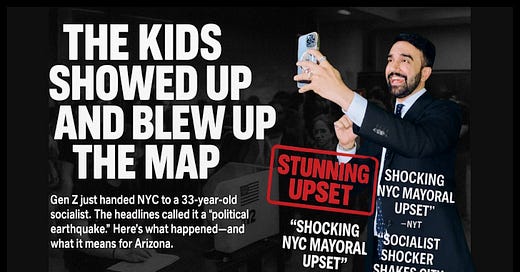The headlines told the story before the pundits even weighed in. The New York Post called Zohran Mamdani’s win a “political earthquake,” while its front page declared it a “stunning upset.” The New York Times described it as a “shocking NYC mayoral race upset,” emphasizing the magnitude of the result. And though the Daily News hasn’t posted its cover yet, their typical tone practically writes itself—something like “Socialist shocker shakes city.” The through-line across all of them is clear: this wasn’t just a surprising election night. It was the moment a powerful, rising youth voice showed up, voted, and flipped the city’s political reality on its head
Let’s stop pretending young voters are unreliable. In New York City this week, they didn’t just show up—they took over. Zohran Mamdani, a 33-year-old democratic socialist from Queens, just crushed Andrew Cuomo in the Democratic primary for mayor. And the reason is simple: Gen Z and younger millennials didn’t wait around for permission. They voted.
This wasn’t supposed to happen. Cuomo had money. He had name recognition. He had the press corps chasing his motorcade like it was still 2010. But what he didn’t have was momentum. Or TikTok. Or any idea what young voters actually care about. Mamdani did.
Young Voters Flipped the Script
The numbers tell the story. According to Gothamist, more than 384,000 New Yorkers voted early in this primary. That’s double the turnout from four years ago. And the biggest spike came from voters aged 25 to 34. They made up nearly 25 percent of early ballots. For comparison, in 2021 they barely cracked 12 percent.
Let me say that again: a group that political consultants usually ignore turned out at twice the rate they did four years ago. That alone would have been a story. But then they delivered Mamdani a win. That made it a movement.
The data’s not just abstract. It’s loud. It’s public. It’s generational.
Cuomo’s Blind Spot
You could see it coming if you looked closely. Cuomo’s campaign was built on nostalgia and name ID. Mamdani’s was built on issues like rent freezes, free public transit, and universal childcare—plus a campaign style that actually spoke to people under 40. He made videos. He knocked doors. He didn’t look like he was running for student council, and he didn’t sound like a focus group.
Cuomo? He grumbled about “ideologues” and blamed the weather. After conceding, even he had to admit what happened: “They got young people to come out and vote.” Right. That’s the whole game.
This Wasn't a Fluke
Here’s the thing no one wants to say out loud: Young voters didn’t just help Mamdani. They made Mamdani. Without them, he’s not even in this race. With them, he’s leading the city’s most powerful political machine by the nose—and reshaping the future of city politics while he’s at it.
According to Axios, Mamdani was polling at 60 percent among 18-to-34-year-olds. That’s a blowout. And unlike other campaigns that treat young people like a side dish, Mamdani gave them the main course. They ate it up and brought their friends.
We’ve spent decades wringing our hands about youth apathy. Maybe we should’ve been asking why politics has been so apathetic toward youth.
The Map Has Changed. Get Used to It.
Mamdani didn’t win because he was some viral fluke. He won because he recognized that the next generation isn’t waiting. They’re broke, pissed off, digitally fluent, and politically awake. They don’t want a seat at the table. They’re building their own damn table.
And this isn’t just a New York story. In Arizona’s 7th Congressional District, early voting is already underway in another crowded Democratic primary. One of the candidates is Deja Foxx, a 25-year-old activist, strategist, and member of the Sustainable Media Center’s Gen Z Board of Advisors. If Mamdani’s win was a thunderclap, Foxx could be next. She’s cut from the same cloth—organizing online and on the ground, speaking to young people in their own voice, and building a campaign around real-world issues Gen Z actually cares about. If youth turnout in Arizona mirrors what just happened in New York, Foxx could shock the system too.
The lesson here isn’t subtle. It’s blunt: Ignore young voters at your peril. Treat them like an afterthought, and they’ll replace you. This isn’t theoretical anymore. It just happened. In New York City. In the middle of June. In a race no one thought could be cracked.
And one more thing: the general election? That’s next. You better believe the kids will be back.





